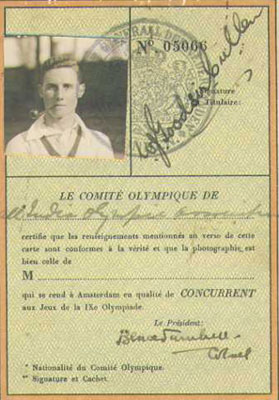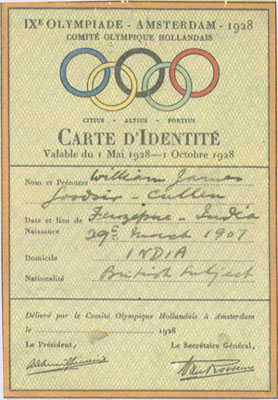GOAL!
Autobiography of Hockey Wizard Dhyan Chand
Published by Sport & Pastime, Chennai, 1952
 ardly had
the echo of the cheering we received on the field died down than the air became
thick with whispers, rumours and speculations about who would be selected for
the Olympic team. Tongues wagged that this man was a dead certainty, and that man
had no chance whatsoever. I must say that the general form of the probables was
of equal standard, and it was a very hard job for the selectors to make their
choice. The difference between one probable and another was small and negligible.
ardly had
the echo of the cheering we received on the field died down than the air became
thick with whispers, rumours and speculations about who would be selected for
the Olympic team. Tongues wagged that this man was a dead certainty, and that man
had no chance whatsoever. I must say that the general form of the probables was
of equal standard, and it was a very hard job for the selectors to make their
choice. The difference between one probable and another was small and negligible.
After the final was over the authorities staged two further trial matches to
make up their minds, as they were not quite satisfied with the data available to
them from the Inter-Provincial tournament. The first trial match was played on
the same day that the final was staged. The venue was the Customs grounds,
adjacent to the CFC ground.
An IHF XI opposed the Central Provinces (CP). This was because CP had lost in
its first match and the authorities thought that they did not have a fair chance
as far as the selection of a national team was concerned. Today, those who are
responsible for the selection of players in our country would be well-advised to
take a lesson from this. The IHF XI won by two goals to nil. One or two reserves
of Bengal who had not yet played were included in the IHF XI. The second and
final trial game was played on February 17 between Possibles and Probables.
On Saturday, February 18, 1928, a provisional Olympic team was announced in
the press. The selectors, Major Burn-Murdoch and Colonel G. P. W. Hill,
announced that the team for the Olympics would be delayed by another 24 hours.
I further gathered that the provisional team would meet a side named as Rest of
India on the CFC ground that evening. We learned that the final choice of the
team would only be made after that evening's game.
Naturally it was a battle of nerves for everyone of us. We first had the
impression that the Olympic team would be chosen based on the form shown in the
Inter-Provincial tournament. But then the selectors needed more data. Then we
were told that the final names would be announced after the two trial matches.
It was again delayed. Thereafter our fate was left to a final trial match
between a provisional Olympic team and the Rest of India.
This final trial match which decided the fate of all the candidates did not
have a single Rajputana player. But we never cared why a certain player was not
taken as many people do nowadays. I again quote a description of the final trial
match from The Statesman:
"It is very doubtful if better forward play has been witnessed in
Kolkata than was provided by the Feroze-Dhyan Chand-Marthins-Seaman combination.
It was not only superlative stickwork, there was a touch of genius in every
movement. The short passing game was made to look positively brilliant in this
game. The judgement of the selectors proved to be well-founded, for the Olympic
XI won by two goals to one." As far as I can remember, the two goals came
from my stick.
It was at last announced that only thirteen players would be chosen from
India, and three or four players who were then in England would be asked to join
the Indian team there. One of them was Jaipal Singh, who was then a big name in
hockey. He was the mainstay of the Oxford University team. As a full-back,
Jaipal Singh had a reputation in England. The natural and obvious choice of
captaining the Indian team fell on him and he joined us in England.
The Nawab of Pataudi, that great cricketer, whether he was a Full Blue or a
Half Blue in hockey I do not know, also joined us. S. M. Yusuf, then at
Cambridge, also added to our number. Our manager, Rosser, looked for a player by
the name of L. C. Carberry, who was then in England, to join us, but Carberry
could not be traced. He was a well-known player of St. Xavier's College, Kolkata.
On the morning of Sunday, February 19, 1928, the final names of the All-India
team were announced. That morning is still green in my memory, even though I was
sure my name would be in the list, since it had appeared in the provisional
list. Yet one could not be too certain. How we prayed for the dawn to come
quickly! Many of us had no sleep. Naturally in every camp talks and speculation
were going on.
One thing strikes me greatly when I compare the state of affairs today.
Nowadays, however much the authorities try to keep a top secret, in some
mysterious way the names leak out. In 1928, all I can say is that not a single
soul knew what was in the mind of the two selectors, Major Burn-Murdoch and Col.
Hill.
Mr. A. B. Rosser (now dead), who was one of the founders of the IHF and was the
Honorary Secretary of the Bengal Hockey Association, was the obvious choice for
the post of the manager of the Indian team, and we were glad he was chosen as
manager. Rosser was a great player in F. C. College, Lahore, and later settled
in Kolkata and played for the Rangers. Mr. Rosser told me later that with his
best efforts he could not find out from the selectors how their minds were
working.
Then came an alarming story. We heard that because the necessary funds could
not be raised, the IHF would be able to send only 11 players instead of 13. It
appeared that owing to Bombay, Madras and Burma having turned a deaf ear to the
appeal for funds, the trip was short of funds by Rs. 15,000.
The announcement added that only if the deficit could be made good, Shaukat
Ali of Bengal and R. A. Norris of CP would accompany the team. It is gratifying
to recall now that it was mainly due to Bengal that the funds were made available and these two
players were able to make the trip.
If I remember right, the announcement also stated that in the event any of
the selected players were not able to make the trip, Boodrie and Lal Shah of
Punjab, and C. Deefholts of Bengal would take their place. But no vacancies
arose.
A doctor appointed by the IHF examined us and found every member of the team
fit. All the players intimated to the IHF their readiness to make the trip.
The biggest surprise was the omission of Ghazanfar Ali, better known as
Chunnan, who was easily the best back in the tournament and an obvious choice.
Being a UP man and staying with us in the camp, it was a great disappointment to
us all when Chunnan was not selected. We learned later that Chunnan was chosen,
but the doctor found that a foot injury made him unfit to play. My information is that
Chunnan did not find a place in the team, not because of his injured foot, but
for some other reason.
After our return from overseas, I met Chunnan in Gwalior during the Scindia
Gold Cup hockey tournament. I could discern the agony and pain on his face at
not having been able to participate in the Olympics, but he was a good sport.
Chunnan, alas, is now no more, and all I would say is "May his soul rest in
peace."
Nowadays there is a wide gulf separating the players from the administrators
who shape the destinies of the game. The two keep to themselves and seldom
mingle. You know what I mean.
After the final trial match, the IHF convened a meeting of the players and
the representatives of the provinces which had taken part in the tournament to
discuss the continuation of the competition. I did not attend the meeting, but I
liked the idea. Will the IHF do likewise today? Back in 1928, the governors of
the game thought that the opinion of the players was also necessary.
Major Burn-Murdoch, president of the IHF, explained why the tournament could
not be run on the league system because the Calcutta Football Club ground might
not have stood the strain imposed on it if the league system was followed. He
was glad that all the provinces sportingly accepted this change, made at the
eleventh hour.
I am referring to this because in my view it was a grand thing for the IHF
president to explain his action to the players and representatives. Have you
heard of a similar approach in modern times? The fact remains that the attitude
of the present day IHF officials is not in keeping with my conception of sport. I
will not be sorry if I am criticised; I am honest in my views and convictions.
The members present at this meeting voted unanimously for the
continuance of the tournament, and it was decided that the Inter-Provincial
Tournament should be held every two years in different centres. Lahore was
chosen as the next venue of the tournament, because Punjab was the only province
in addition to Bengal to have taken part in the first competition in 1926.



1928 Olympic Games Photo Identity Card - Courtesy Dayan
Goodsir-Cullen


